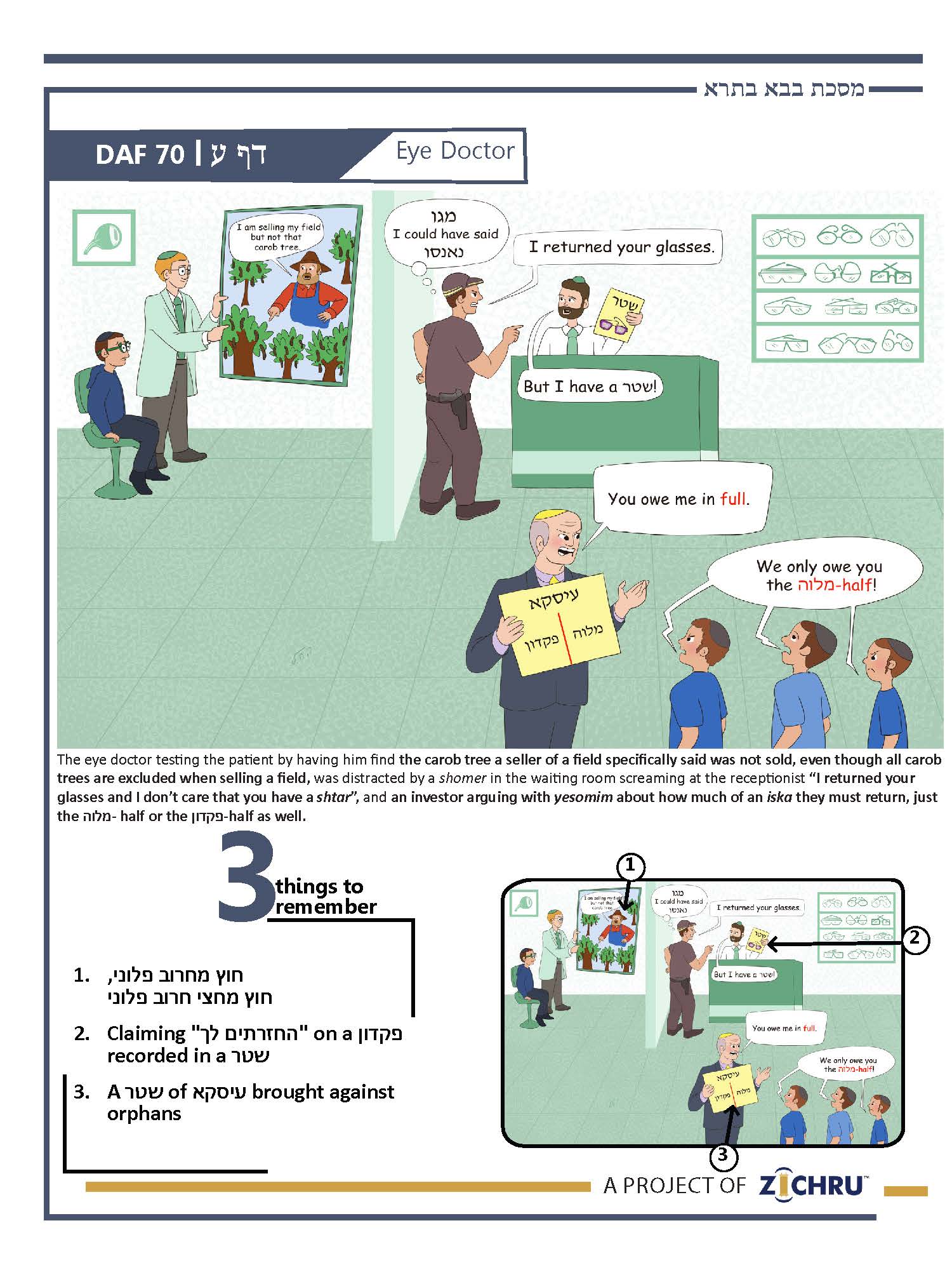- Audio Timestamps
0:00 - The 3 Sugyos
2:57 - Review of 3 Sugyos
5:48- Siman
9:08 - 4 Blatt Back Chazarah
16:04 - Pop Quiz (Last 7 blatt)
For access to all Zichru resources including PDFs, and illustrations CLICK HERE
- חוץ מחרוב פלוני, חוץ מחצי חרוב פלוני
Rav Acha bar Huna asked Rav Sheishess: חוץ מחרוב פלוני – If the seller said he is selling his field “except for [that specific] carob tree, חוץ מסדן פלוני – or “except for [that specific] pruned sycamore, what is the halachah? Although one normally does not acquire such significant trees with a field, does this phrase imply that the buyer should acquire all the other carobs? Or is this added term presumed to be increasing his rights, or just making absolutely sure he retains it? Rav Sheishess answered that he does not acquire the other carobs either, and brought as proof, that if one said: שדי מכורה לך חוץ משדה פלונית – “My field is sold to you, except for [that specific] field,” certainly we do not infer that the buyer acquires all his other fields! Carob trees are also viewed as independent properties. In another version, Rav Sheishess was asked about one who said: חוץ מחצי חרוב פלוני – “except for half of [that specific] carob tree.” Although he definitely does not acquire the other trees (as above), do we infer that he acquires the other half of this tree? Rav Sheishess answered that he does not, based on a similar argument.
- Claiming "החזרתים לך" on a פקדון recorded in a שטר
Rav Amram asked Rav Chisda: המפקיד אצל חבירו בשטר – if someone left a פקדון with his fellow and it is recorded in a שטר, and the נפקד said: "החזרתים לך" – “I returned it to you,” is he believed? Do we say: מיגו דאי בעי אמר נאנסו מהימן – since if he wanted to lie, he could have said, “[The פקדון] was lost through an unavoidable accident,” and he would be believed, so he is also believed to claim he returned it? Or can the מפקיד reply: שטרך בידי מאי בעי – “If you returned it, what is your שטר doing in my hand? Had you returned the פקדון, you would have demanded the שטר!” The Rashbam notes that the נפקד’s מגו should be like a מה לי לשקר במקום עדים. Rav Chisda said the נפקד is believed and explained that since the נפקד knew he could claim נאנסו at any time, and the מפקיד could not disprove this by arguing שטרך בידי מאי בעי, the נפקד felt no urgency to retrieve the שטר. Still, since the נפקד would have to swear if he would claim נאנסו, he must also swear if he claims he returned it.
- A שטר of עיסקא brought against orphans
The Gemara suggests that Rav Chisda’s ruling above is a machlokes Tannaim in a Baraisa: שטר כיס היוצא על היתומים – a certificate of investment which is brought against orphans, i.e., an "עיסקא" investment which was managed by the father, which the investor claims from his heirs’ estate, the דייני גולה say: נשבע וגובה כולו – he swears he was never paid and collects it fully, and the דייני ארץ ישראל say he swears and collects only half. Since half the money of an עיסקא is considered like a loan, and half is like a פקדון, the “loan-half” is definitely collected, since the father would have had to pay it as well (having no defense against the שטר). The Tannaim argue about the “פקדון-half,” and the Gemara suggests they argue about Rav Chisda’s ruling (whether the father could have claimed he returned it). The Gemara concludes that they can all agree with Rav Chisda, but the דייני גולה argue: אם איתא דפרעיה מימר הוה אמר – if it happened that he repaid him, he certainly would have said so to his children before his death. The דייני ארץ ישראל respond: אימור מלאך המות הוא דאנסיה – We can say the מלאך המות snatched him before he could instruct his children.
Siman – Eye Doctor
The eye doctor testing the patient by having him find the carob tree a seller of a field specifically said was not sold, even though all carob trees are excluded when selling a field, was distracted by a shomer in the waiting room screaming at the receptionist “I returned your glasses and I don’t care that you have a shtar”, and an investor arguing with yesomim about how much of an iska they must return, just the מלוה- half or the פקדון-half as well.







